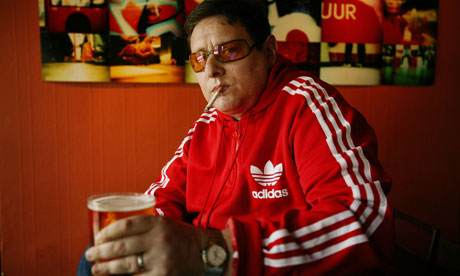
Shaun Ryder is a very bad man, as his most ardent fans would be the first to admit. Ever since his first band, Happy Mondays, lurched out of the apparently Dickensian squalor of Salford in the late 1980s, tales of hedonism, damage and wickedness have orbited the Mondays like a sulphurous miasma.
Sure, the Mondays made music, some of it terrific. Their first three albums proffered a lairy agglomeration of funk, guitar-pop, rock and dance music, a sound that slotted in with Factory Records' second incarnation as the crucible of "Madchester". Ryder's stream-of-semi-consciousness lyrics transformed this groovy soup into something exceptional.
But the rest of the time (well, most of the time, really) they were party animals, petty thieves (aka "sneaks"), drug dealers, touts and bootleggers (often of their own tickets, gigs and merchandise) with moral compasses so banjaxed they spun like Wurlitzers. Nowadays, they might have been called feral.
Needless to say, being that shameless was a huge part of the Mondays' appeal. The band updated rock'n'roll's class-defying, outlaw discourse for a new era – the ecstasy-fuelled, post-Thatcherite 90s-cusp free-for-all. There are countless accounts of this period already out there; what distinguishes Ryder's is the fact that it's finally coming out of the horse's mouth (with Observer scribe Luke Bainbridge acting as horse whisperer). Anyone coming to Ryder as the lovable rogue who tucked into crocodile penis and bickered with Gillian McKeith on I'm a Celebrity… should have some smelling salts of their own to hand when they crack the spine.
As Ryder tells it, the Mondays really did deal Es from an alcove in the Hacienda until the club was full every night and an entire nation was hooked. Loved-up hooligans have become the stuff of cliche, but Ryder enthrallingly describes the ethnography of the time, of various Mancunian criminal factions ending their blood feuds over the pills, and squaddies hugging and repudiating war. He saves his most lyrical chemical recollections, though, for youthful night-time walks on acid with Bez, the band's dancer and, latterly, Celebrity Big Brother winner. "You would develop this night time vision with weird trails and then BANG! It's daylight and you're soaked in glorious Technicolor. As dawn approached we would be waiting for the sunrise, waiting for those colours to just overwhelm us." Their first rocks of crack in New York? "Ffffuuuuuuucckkin heeeeeeeeeeellll." Cold turkey with Naltrexone implants? "I was actually begging Tom [Bruggen, Ryder associate and film-maker] to punch me and knock me flat out, because I knew that was the only way to get some respite from it."
Every autobiography wants to set the record straight – if that is the right phrase here, given the dodgy dealings littering every page. Ryder would never have been seen dead, he tells us, in the Joe Bloggs top his character wore in Michael Winterbottom's cinematic re-creation of the era, 24 Hour Party People.
Legend has it that Ryder held hostage the master tapes of the Mondays' ill-fated fourth album, Yes Please, extorting money from Factory and putting the label on the path to bankruptcy. The band were recording in Barbados in an effort to keep Ryder away from heroin. (The island was, instead, awash with cheap crack.) Ryder says he only agreed to the scam so that Yes Please's producers, Chris Frantz and Tina Weymouth, would get paid, since Factory was already in freefall. "Really, my loyalty should have been to [Factory boss] Tony [Wilson] and Factory," he notes.
Ryder's charm has always lain in the disjunction between his two personae – scumbag and seer. But even after rehab and therapy, he doesn't really do rueful. He does feel bad about a few things – crying at Wilson's hospital bedside, not being around when his eldest children were little. Towards the end of the book, he describes the lost years of emotional deep freeze from which he is still emerging. Sometimes, though, Twisting My Melon seems to pass in an almost banal litany of pharmacologically inspired misdemeanours, recounted matter-of-factly, without particular glee or regret.
The best thing about the book is its unstinting candour. The Mondays throw their manager, Nathan McGough (son of the poet Roger), in the bath and beat him with pillowcases full of soap bars after he is robbed of £1,000 of the band's money. Years later, Ryder's new band, Black Grape, catch some opportunistic sneak trying to rob their tour bus. They take him hostage and threaten to drown him until he is incontinently pleading for his life on a beach. Ryder is justifiably bullish about his contribution to the Mondays sound and about his second coming as Black Grape. But unlike most musicians' autobiographies, there aren't enough passages here about Ryder's love for music. Regrettably, too, you only get fleeting glimpses of the surreal poetics that made Ryder the dissolute bard of baggy. But then, Ryder's gift probably isn't the kind that lends itself to the cold light of anything. And so this sober chronology of a life lived indulgently leaves you craving something more.

